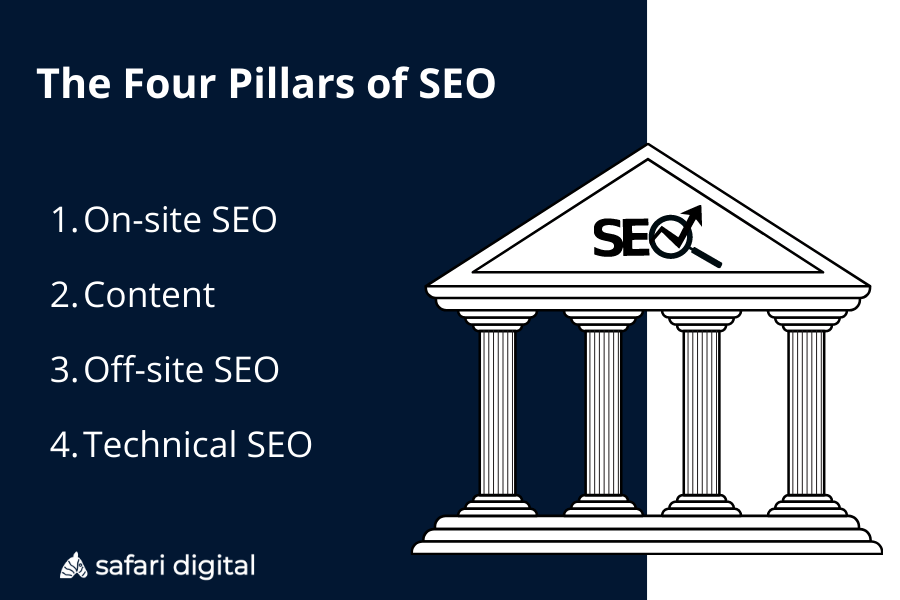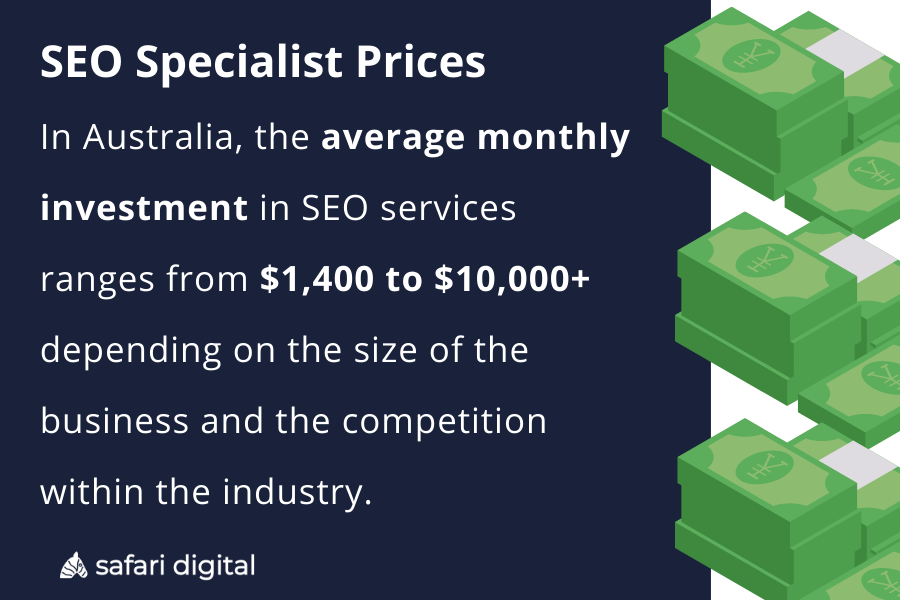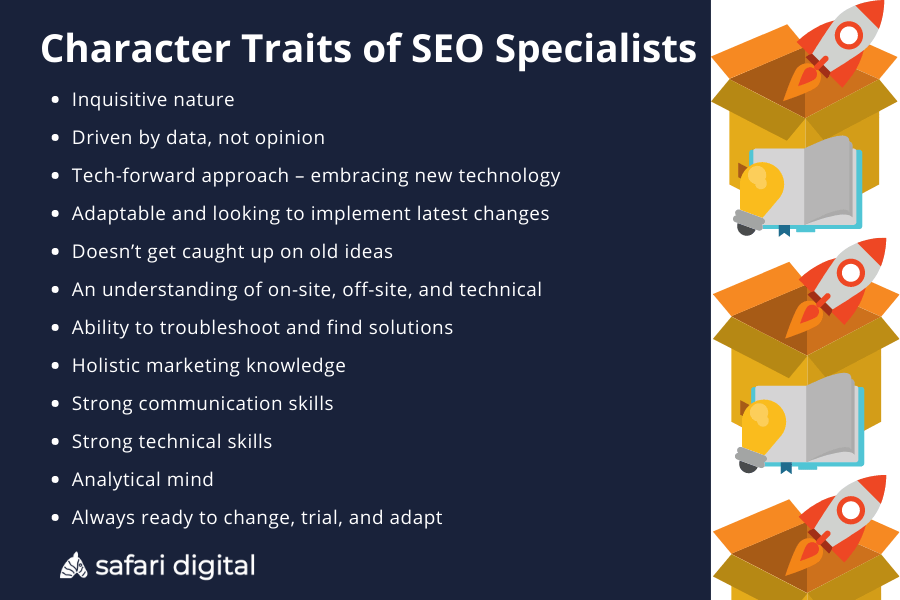SEO Specialist
Understanding the value of partnering the the right SEO specialist in 2024.
Safari Digital’s SEO specialist guide can help you to understand the roles, responsibilities, and advantages of working with a search engine optimisation specialist for your business. Discover why more than 63% of small to medium-sized businesses in Australia work with an SEO expert – and why you should be doing so as well, with our straightforward guide for 2024.
SEO consultants are in high demand.
Whether you’re working client side (with a company in their staff) or you’re part of an SEO Agency working with a multitude of clients across different industries, qualified SEO professionals have the ability to change the trajectory of a business.
There are hundreds of factors that go into ranking a website. As the industry continues to change and evolve, SEO specialists need to have a dedicated focus in order to excel in the industry. SEO specialists need to stay on their toes and continue to learn about the latest trends and changes.
In this article, we’ll take a look at the role, responsibilities, and traits required to become an SEO specialist and excel in the industry.
Table of Contents
- Understanding the value of partnering the the right SEO specialist in 2024.
- What does an SEO specialist do?
- Responsibilities
- Who can benefit from SEO?
- When is the right time to hire an SEO?
- How long does it take to see results?
- How much does an SEO consultant cost?
- Specialist vs. Agency – what’s the difference?
- What to look for in an SEO expert
- How to get into SEO
What does an SEO specialist do?
An SEO specialist works with businesses or individuals to develop search engine optimisation strategies that are designed to improve rankings, increase visibility, and meet unique KPIs.
An SEO specialist is tasked with conducting research, analysing search trends, and developing customised strategies that can help a website rank higher for lucrative search terms. Ultimately, the goal is to increase exposure for keywords and search phrases that increase bookings, online sales, or grow brand awareness. The goal of an SEO campaign will depend on the unique goals of the client, however, there will always be a consistent emphasis on ranking at the top of search engines for a set of search phrases.
Unlike generalist digital marketing specialists who focus on Social Media, Email Marketing, and Paid Marketing channels like Google Ads, an SEO specialist focusses exclusively on generating organic traffic through higher search engine rankings.
Responsibilities
An SEO specialist is responsible for improving the on-site, off-site, content, and technical factors that all contribute to improving the organic rankings of a website. Generally speaking, an SEO specialist will specialise in one of the four areas mentioned above.
To cover all of these roles and do it well, an SEO specialist would not be able to work with more than one of two clients at any one time. SEO companies or agencies will normally segment these roles to different departments which means, collaboratively, the end-to-end process of SEO can be completed.
Here is a look at how those roles differ and the types of improvements that an SEO specialist will make to those areas of the SEO strategy.

On-site SEO
On-site or On-page SEO refers to the process of optimising all of the on-site elements that play into how a website ranks in Google search. An on-site specialist will focus on improving the following areas in order to improve organic rankings:
• Keyword research
• User intent research
• Meta data optimisation
• Content planning
• Image optimisation
• URL structure/permalink structure
• Mobile friendliness
• Internal link structure
An On-site SEO specialist will normally have a background in copywriting with advanced technical experience across range of different CMS platforms including WordPress, Shopify, Squarespace, and Wix.
Off-site SEO
Off-site or Off-page SEO refers to all of the actions that occur off a website that influence organic search rankings. Most obviously, this includes backlinks – a ranking factor which (at the time of writing) accounts for around 50% of how a website ranks in the organic search results. Some of the most important aspects of off-site SEO include:
• NAP link building
• Google my business optimisation and management
• Backlink building
• Guest posting
• PR link strategy
• Social media syndication
• Social bookmarking
• Customer review management
Understanding all of the intricacies of off-site SEO is a full-time job. If you are a company that is looking to employ an SEO specialist, then it is likely that you will still need to outsource your off-site SEO specialist.
Content
Content plays an indispensable role in every successful SEO strategy. Whether you look at the content that you write for key transactional landing pages, or the ongoing content marketing aspect of an SEO campaign – having a content strategy in place is essential for SEO success.
Some of the key responsibilities for a content-led SEO marker include:
• Keyword research
• Keyword strategy
• Competitor analysis
• Content strategy
• Site structure
• Copywriting
• Meta tag optimisation
• Infographic creation
A content-focussed SEO specialist will usually have a background in copywriting, media, or journalism. Most content SEO specialists will have a background of study that includes Communications or Journalism at University.
Technical SEO
Technical SEO requires an advanced understanding of on-page SEO. Generally, technical SEO specialists will have a background in development and coding and will have a deep understanding of the technical elements that are required to increase search engine visibility. Most SEO companies will have one (or multiple) dedicated technical SEO expert who is responsible for the technical optimisation of a website.
Some of the roles and responsibilities of a technical SEO professional include:
• Site crawling
• Site indexing
• Duplicate content assessments
• Structured data
• Site speed
• Image optimisation
• Site architecture
• XML sitemaps
• URL structure
• Site error code troubleshooting
Mastering technical SEO takes advanced programming and SEO skills that must be applied across a range of different coding languages and CMS platforms. To many, technical SEO proficiency is the final frontier of SEO knowledge and is only possible when an advanced level of on-page SEO knowledge has been acquired.
Who can benefit from SEO?
Any business that is serious about improving their organic search visibility, reducing their reliance on paid marketing channels, and building a sustainable lead funnel for their business can benefit from working with an SEO specialist.
Whether you are just starting out, or you are an existing business that is looking for ways to revamp their online SEO presence, investing in SEO is a cost-effective way to build a funnel that can work for your business. A recent study found that most businesses will begin to SEO an ROI-positive result on their SEO investment within the first 4.3-months of engaging an SEO specialist.
When is the right time to hire an SEO?
While it can be said that any business that is looking to improve their online search visibility can benefit from working with an SEO professional, it’s always a good idea to get them involved as early on in the process as possible.
If you are launching a new brand, new website, or changing your business to a new URL, it is a good idea to hire an SEO consultant before you begin. Having an SEO expert involved from the get-go means that they will be able to provide guidance, reduce double handing, and ensure that you don’t take an missteps that could land you on Google’s bad side.
A good SEO professional will also be able to help you integrate SEO into your overall digital marketing strategy. Understanding keywords and keyword intent can help businesses to make smarter digital marketing decisions for other online channels.
How long does it take to see results?
SEO is not an overnight fix or a quick-win strategy. Building trust with Google and ranking at the top of search engines for valuable, revenue-generating keywords takes time. In general, we provide the following guidance for business owners:
Established websites (2+ years old)
• 1-3 months – expect to see some movement on low to mid competition keywords
• 3-6 months – expect to see strong rankings for mid-level keywords, and movement on high-competition keywords – perhaps to a strong position on page 2.
• 6-9 months – SEO really starts to hit its stride with strong rankings on mid competition keywords (top 5) and high competition keywords now moving onto page 1 of Google.
• 9-12 months – Strong rankings across most mid to high competition keywords. Extremely competitive national keywords may take 12+ months.
New websites (<12-months old)
• 1-3 months – expect minimal movement on low to mid competition keywords – your website is in Google’s sandbox and still being tested for trust.
• 3-6 months – expect to see some movement on low competition keywords (50-200 searches per month)
• 6-9 months – expect to see some of your mid competition keywords moving to the bottom of page 1 of Google.
• 9-12 months – your mid competition keywords are now performing strongly and some of your high-competition keywords have now started to appear on page 2-3 of Google.
The best time to invest in SEO for your business was years ago – the second-best time is right now. The sooner that you invest in SEO, the sooner that you can expect to see results in the form of improved organic rankings and traffic.
How much does an SEO consultant cost?
The prices charged by an SEO specialist will be dictated by the amount of time and resources that they invest in your business. In Australia, the average monthly investment in SEO services ranges from $1,400 to $10,000+ depending on the size of the business and the competition within the industry.

As you may expect, the more that you spend on SEO, the faster you can expect to see results. SEO specialists who are able to spend 2-3 days per week focussing exclusively on your website are inherently going to get more done than an SEO professional that completes work once per week.
The other factor to consider is the experience of the SEO professional that you are engaging. Just like any role, more experienced SEO professionals charge a higher premium than entry-level specialists.
Specialist vs. Agency – what’s the difference?
An SEO specialist and an SEO agency are engaged for the same reason – to improve the organic visibility, increase organic leads, and create a sustainable marketing funnel for a business.
The biggest difference is that an SEO specialist is an independent contractor that works with a small number of clients at any one time (usually focussing on one or two aspects of SEO). Conversely, an SEO agency will have a team of on-site, off-site, content, and technical SEO specialists that will work simultaneously to achieve the best possible outcome for a website.
An SEO company is made up of a collective of SEO specialists that bring different skills to the table. If you are looking for help with a single aspect of an SEO strategy – such as content or link building, then hiring a freelance SEO specialist may be a good choice. If you’re looking to work with an SEO provider that can deliver end-to-end SEO solutions, then an SEO company may be a better choice.
What to look for in an SEO expert
Finding an SEO specialist that takes the time to understand your business and can come up with solutions that help to increase rankings and drive relevant, high-value search traffic can be difficult. While there is no mould for a perfect specialist, there are some things that you can look out for when hiring internally or employing an external consultant to work on your website.

Here are some transferrable characteristics and skills to look out for in an SEO professional:
• Inquisitive nature
• Driven by data, not opinion
• Tech-forward approach – embracing new technology
• Adaptable and looking to implement latest changes
• Doesn’t get caught up on old ideas
• an understanding of on-site, off-site, and technical
• Ability to troubleshoot and find solutions
• Holistic marketing knowledge
• Strong communication skills
• Strong technical skills
• Analytical mind
• Always ready to change, trial, and adapt
The types of skills and personality traits that matter to an SEO professional will vary depending on whether they work on content (more creative), on-site (more analytical), off-site (data driven), or technical (technical mindset) aspect of an SEO campaign.
Finding a strong SEO allrounder is easy, finding a search engine optimisation specialist that takes the time to master one aspect of SEO is hard work.
How to get into SEO
SEO specialists come from a range of different backgrounds, different university degrees, and offer a different skillset depending on the role that they are filling. Some of the most popular university degrees that SEO specialists have include:
• Bachelor of Marketing
• Bachelor of Media Studies
• Bachelor of Communications
• Bachelor of Information Technology
• Bachelor of Business Administration
The truth is this; nothing at university will properly equip you for life as an SEO specialist. A University Degree is a prerequisite for a lot of digital marketing careers, however, when it comes to SEO, it comes down to your ability to problem solve and your willingness to learn.
The most successful SEO specialists are not the ones with two university degrees. They are the individuals who are naturally curious and ready to make mistakes, learn, and surround themselves with people who have been in the industry for a long period of time.
With so much information available online, it is possible to enter the search engine optimisation industry without any degree at all, so long as you have taken the time to learn and up-skill yourself using the library of online resources that are at your disposal.
Get in Touch
What are you waiting for? Our team is ready to work with you to create a custom SEO strategy that will inundate your business with high-converting leads.



